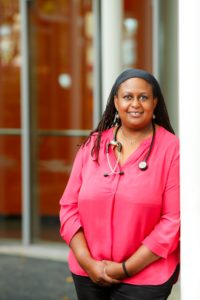
Dr Chipo Githinji
It is impossible for most of us to imagine what it is like to flee the place you call home, leaving the family you love and everyone you have ever known to start a perilous journey to a new land.
Now imagine you are only 15 and have to make that journey on your own in the most dangerous conditions. For many young people, that nightmare is a reality.
Last year, 3,043 unaccompanied children claimed asylum in the UK, seeking safety from countries where they and their future were at risk. When they reached our shores, they were often scared, lonely and in desperate need of medical and support services.
A new service provided by Kent Community Health NHS Foundation Trust is offering a beacon of hope to these vulnerable young people. Working closely with colleagues at Kent County Council, a team of KCHFT doctors, including Chipo Githinji, Sunil Bhide, Saudamini Bhide and Sue Leather, have been offering thorough medical assessments at reception areas in Kent for children aged 15 to 18-years-old, seeking asylum.
A priority for Dr Chipo Githinji has been providing holistic assessment and support. She said: “I have been working in community paediatrics for some time and feel particularly passionate about supporting unaccompanied asylum seeking children.
“By the time they reach us, they have been through so much and they are in real need of our help and support. The assessment we provide is very structured, particularly looking out for their mental health needs, any signs of post-traumatic stress disorder (PTSD), as well as the regular health checks you would expect for young people.
“Many of them arrive with no medical history and some do not even know their birth date so we also screen their hearing, vision, dental needs and immunisation history.”
The work is not without its challenges as few of the children speak English and many of them are traumatised from a lengthy journey that may have involved captivity, trafficking and prostitution.
Chipo said: “This programme works so well because we have a number of agencies working together to support the best possible outcomes for these children. The KCC interpreter and key workers we work alongside care for these children as if they are their own family.
“It’s challenging but also hugely rewarding as we may be the first friendly face they have seen in a long time. When they come to us I think they are still high off the fact they have finally made it and are looking forward to a new life. They feel safe and are happy to talk about their experience because I think they are so anxious about whether they will be allowed to stay. It is inspiring how resilient and strong they are.”
Once life starts to calm down, the signs of stress and anxiety start to show. Chipo said: “We have to be very aware of how they are feeling and reacting to their new situation. Once they have settled in and life becomes less chaotic, they start to feel lonely, isolated and have the time to think too much about the past. Before they are focused on survival, now they are consumed by the reality of what has happened and it can make them very anxious and depressed.”
As a result of the assessment, patients can be directly referred into mental health support services and activities are in place to support the young people, mostly boys, to become active and social.
“What they want most is to lead a normal life again, for one child that was being able to attend a Christian Orthodox church, for others it’s playing football or arranging for them to join a gym. Before the trauma and conflict they were living a normal life and that is what they crave the most.’’
Despite her years of experience, Dr Chipo is still deeply moved by the stories her patients share.
She said: “I think it is easy to forget that behind every story is a real person and that person had a family and a life they loved before this conflict took it all away from them. They may have no idea where their family is or no way of speaking to them and that is isolating for anyone, let alone a child.
“Some of them tell us how they had to leave to escape from the Taliban, had to walk for days to get to one place and then were held captive for weeks before they could escape again and keep moving. Days, weeks and months of the
unknown – fear and danger.
“This service provides some small way that we can make a difference.”
